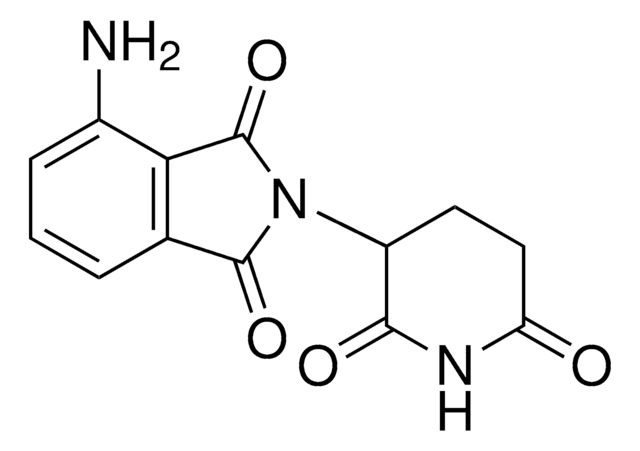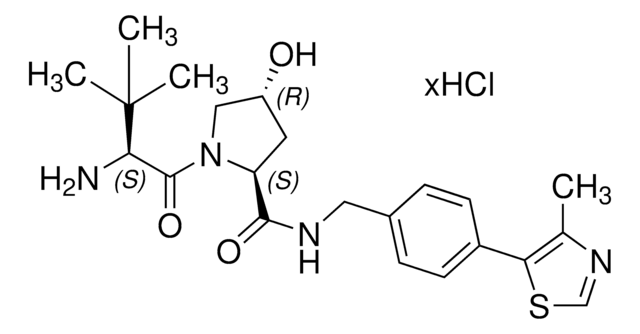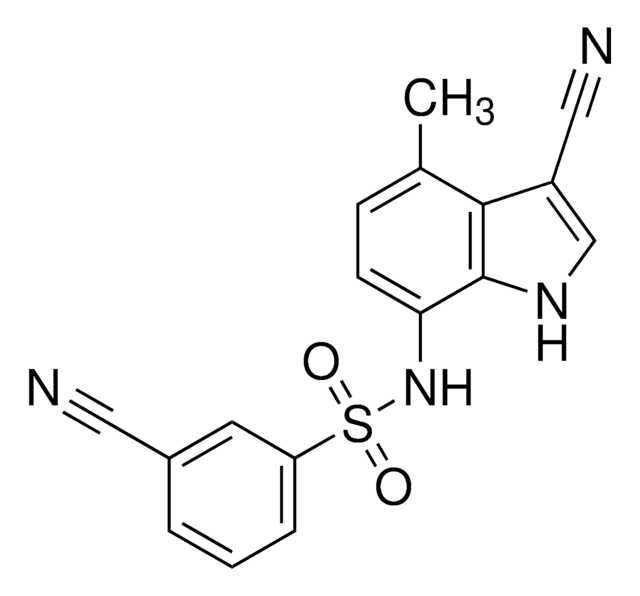911739
C5 Lenalidomide-PEG1-NH2 hydrochloride
≥95%
Sinonimo/i:
2-(2-Aminoethoxy)-N-(2-(2,6-dioxopiperidin-3-yl)-1-oxoisoindolin-5-yl)acetamide hydrochloride, C5 Lenalidomide conjugate, Crosslinker−E3 Ligase ligand conjugate, Protein degrader building block for PROTAC® research, Template for synthesis of targeted protein degrader
About This Item
Prodotti consigliati
ligand
C5 Lenalidomide
Livello qualitativo
Saggio
≥95%
Forma fisica
powder
Impiego in reazioni chimiche
reactivity: carboxyl reactive
reagent type: ligand-linker conjugate
Gruppo funzionale
amine
Temperatura di conservazione
2-8°C
Stringa SMILE
O=C1N(C2CCC(NC2=O)=O)CC3=CC(NC(COCCN)=O)=CC=C31.Cl
Applicazioni
Automate your CRBN-PEG based PROTACs with Synple Automated Synthesis Platform (SYNPLE-SC002)
Altre note
Portal: Building PROTAC® Degraders for Targeted Protein Degradation
Targeted Protein Degradation by Small Molecules
Small-Molecule PROTACS: New Approaches to Protein Degradation
Targeted Protein Degradation: from Chemical Biology to Drug Discovery
Note legali
Prodotti correlati
Avvertenze
Warning
Indicazioni di pericolo
Consigli di prudenza
Classi di pericolo
Repr. 2 - STOT RE 2
Organi bersaglio
Blood
Codice della classe di stoccaggio
11 - Combustible Solids
Classe di pericolosità dell'acqua (WGK)
WGK 1
Punto d’infiammabilità (°F)
Not applicable
Punto d’infiammabilità (°C)
Not applicable
Scegli una delle versioni più recenti:
Certificati d'analisi (COA)
Non trovi la versione di tuo interesse?
Se hai bisogno di una versione specifica, puoi cercare il certificato tramite il numero di lotto.
Possiedi già questo prodotto?
I documenti relativi ai prodotti acquistati recentemente sono disponibili nell’Archivio dei documenti.
Articoli
Partial PROTACs are a collection of crosslinker-E3 ligand conjugates with a pendant functional group for covalent linkage to a target ligand.
Partial PROTACs are a collection of crosslinker-E3 ligand conjugates with a pendant functional group for covalent linkage to a target ligand.
Contenuto correlato
Targeted protein degradation (TPD) is an emerging drug discovery strategy that uses small-molecules, such as proteolysis-targeting chimeras (PROTACs), to eradicate targeted proteins linked to disease from cells.
Il team dei nostri ricercatori vanta grande esperienza in tutte le aree della ricerca quali Life Science, scienza dei materiali, sintesi chimica, cromatografia, discipline analitiche, ecc..
Contatta l'Assistenza Tecnica.









